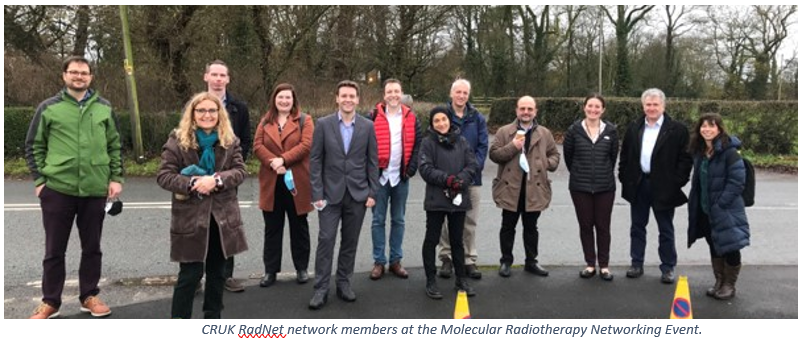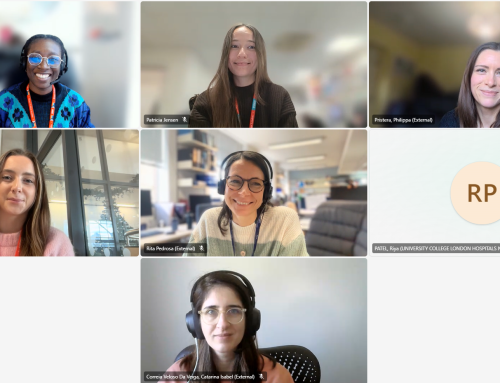On 30th November 2021, members of Cancer Research UK (CRUK) RadNet City of London organised a networking event to bring together researchers from across the CRUK RadNet network with an interest in molecular radiotherapy (the systemic administration of a radioactive drug targeted to cancer). The event was organised as part of the Radionuclides for Health UK project, which aims to highlight the need for UK sources of the radionuclides used in health and medicine.
Funded by CRUK RadNet, the event was organised by CRUK RadNet City of London members Dr Jane Sosabowski and Dr Jennifer Young, and held at the National Nuclear Laboratory (NNL) – a key collaborator in the Radionuclides for Health UK project.
Dr Sosabowski, Reader in Molecular Imaging at Barts Cancer Institute, Queen Mary University of London said: “Molecular radiotherapy is an exciting area of cancer research and we are seeing unprecedented global interest in the field. The initiative from NNL to provide us with rare radionuclides allows UK researchers to move this area forward for the benefit of UK patients.”
Currently, the UK has no home-grown supply for the vast majority of radionuclides (atoms that emit radiation as they undergo radioactive decay) needed for the diagnosis and treatment of health conditions, especially cancer. However, the NNL has identified nationally held materials containing significant quantities of useful radionuclides and for which it is developing extraction and purification techniques as part of its Health & Nuclear Medicine Focus Area Programme. The aim of the networking event was to make researchers aware of the expertise and radionuclides available at NNL and to identify opportunities for collaboration, both with NNL and across UK academic centres.
During the event, visitors were shown around the R&D facilities at the Preston NNL site, and each researcher shared information about the facilities for molecular radiotherapy research within their RadNet centre/university as well as their molecular radiotherapy research interests.
NNL shared its plans to build a Radiopharmaceutical Development Laboratory that will be open for UK researchers to use in 2022. The facility will allow researchers to handle radionuclides without having to set up facilities at their own universities, avoiding the need for each university to make amendments to their environmental agency permits or to hold the radioactive waste.
Tim Tinsley, Account Director at the National Nuclear Laboratory said – “NNL currently has a world-leading capability in the area of complex chemical separation and purification of nuclear material obtained from many years of experience. Our principle objective within the Health and Nuclear Medicine sector is to develop production routes of radioisotopes needed to develop new therapeutic treatments. This is a significant new opportunity for NNL and core to our new purpose of nuclear science to benefit society. We intend to work with our academic and commercial partners to help create the UK the indigenous supply of radioisotopes it needs.”
Creating collaborations for the future
Speaking of the event, Dr Young from the School of Biomedical Engineering and Imaging Sciences at King’s College London said: “The day was a great opportunity to learn about NNL and what others across the UK are doing in the field of molecular radiotherapy. We hope that researchers will disseminate their learnings back to their RadNet centre and beyond and that we have created collaborations for the future.”

In total, 11 academic researchers and 5 of the NNL Health and Nuclear Medicine team attended the networking event. Those in attendance represented six of the CRUK RadNet Centres (City of London, ICR and RMH, Glasgow, Cambridge, Oxford and Manchester) and the MITHRAS programme along with two other centres with expertise in radiochemistry and nuclear physics (the University of Hull and Bangor University). The researchers spanned a number of disciplines including cancer biology, chemistry, radiochemistry, radiopharmacy, clinical nuclear medicine, medical physics and nuclear physics.
More information
- You can follow Radionuclides for Health UK on Twitter @RadionuclidesUK to keep up-to-date with news and announcements
- Find out more about the research at CRUK RadNet City of London





Leave A Comment